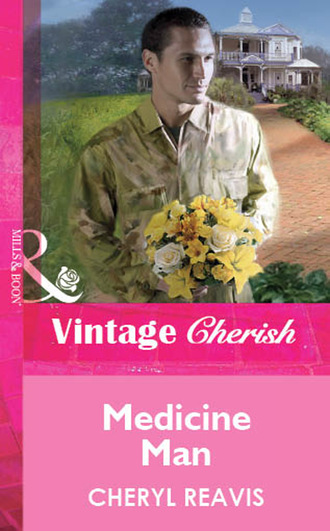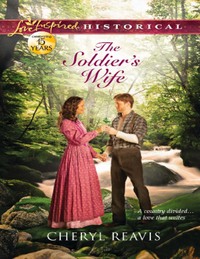
Полная версия
Medicine Man

The sound of the rain grew louder overhead, and there was a loud crack of thunder.
“Male rain,” Will said, watching the trees bend under the onslaught of the rising storm.
“Rain has a gender?”
“Where I come from it does.”
“What’s a female rain like?”
“Steady. Gentle. Soft.”
After a moment Arley stepped closer.
“I know you’re tough—Airborne and all that—and I don’t want you to panic because this is not because I think you need it,” she said. “This is because I need it—so I’ll feel better.”
With that, she slid her arms around him, resting her head against his shoulder.
He intended to end the embrace, to step away while he still could, but she lifted her head and looked at him. She was so close, her body soft and warm against his. He tried to smile and didn’t quite make it. Instead, he slowly lowered his mouth to lightly touch hers.
Dear Reader,
What a capricious thing a writer’s muse can be. More than once I’ve thought a character’s story had ended only to discover that that wasn’t the case at all. They’re still there somehow, but out of sight, waiting for just the right opportunity to step into the limelight again.
I first encountered Will Baron when he was three years old, and what a great writing pleasure it was to create a better life for this abandoned little boy. Will was happy. End of story. Or so I thought.
Then, here he came again when he was a teenager, both helping and needing help, filling an important supportive role in other stories I wanted to tell and yet still yearning for things he would have been hard pressed to name.
And now, here he is one more time—with his own story at last. Medicine Man is Will Baron’s journey to finally find the place where he truly belongs and to win the heart of the woman he is struggling so hard not to love.
I hope you’ll enjoy reading it, and I hope you’ll visit me at my Web site: www.members.authorsguild.net/cherylreavis/
Best always,
Cheryl Reavis
Medicine Man
Cheryl Reavis

www.millsandboon.co.uk
CHERYL REAVIS
award-winning short story author and romance novelist who also writes under the name of Cinda Richards, describes herself as a late bloomer who played in her first piano recital at the tender age of thirty. “We had to line up by height—I was the third smallest kid,” she says. “After that, there was no stopping me. I immediately gave myself permission to attempt my other heart’s desire—to write.” Her Silhouette Special Edition novel A Crime of the Heart reached millions of readers via Good Housekeeping magazine. Both A Crime of the Heart and Patrick Gallagher’s Widow won the Romance Writers of America’s coveted RITA® Award for Best Contemporary Series Romance the year they were published. One of Our Own received the Career Achievement Award for Best Innovative Series Romance from Romantic Times BOOKreviews. A former public health nurse, Cheryl makes her home in North Carolina with her husband.
For all the readers who have written to ask me what
happened to Will Baron. This is for you, with my
sincere thanks for your kind comments and support.
Special thanks, too, to Vanessa’s sergeant
for answering my many questions.
Any mistakes are mine, not his.
Contents
Chapter One
Chapter Two
Chapter Three
Chapter Four
Chapter Five
Chapter Six
Chapter Seven
Chapter Eight
Chapter Nine
Chapter Ten
Chapter Eleven
Chapter Twelve
Chapter Thirteen
Chapter Fourteen
Chapter Fifteen
Chapter Sixteen
Epilogue
Chapter One
I never should have come.
Arley Meehan stood in the middle of her sister Kate’s boisterous wedding reception, trying not to look as miserable as she felt. The pub was packed with military personnel, the Airborne contingent from Fort Bragg, courtesy of Kate’s new husband—his side of the family, as it were. She was happy for Kate, for them both—of course she was—and she had wanted this opportunity to get out and have a good time for a change. But weddings were no place for the newly-divorced, no matter how bad the marriage had been, and Arley wished now that she had stayed home with her little boy for an evening of fast food and popcorn, a rented movie and lots of giggling.
The Celtic/bluegrass band her uncle Patrick had hired for the occasion suddenly straddled both genres and began to play a wooden-whistle-and-banjo-spiked rendition of “Sally Goodin,” much to the delight of the guests. A few of the more adventurous couples began to dance, whether they actually knew how to or not, making Arley’s immediate vicinity a dangerous place to be. She moved out of the way, dodging a number of low dips and high kicks in the process, and she recognized a soldier standing alone on the other side of the pub. She knew his name—Specialist Will Baron. He was a medic who worked with Kate at the post hospital and, at the moment, was looking every bit as alone as she felt. Arley had met him once, in passing, last summer, before she and her sisters had even noticed that Kate had been well on her way to marrying a seriously injured paratrooper.
Arley swiftly headed in his direction. She had been given a token assignment for the night—something her oldest sister, Grace, had devised to keep Arley the Handful out of trouble. She was supposed to circulate among the guests and make sure everyone was having a good time, which had seemed totally unnecessary until now. Clearly, Will Baron was the place to start.
“So how homesick are you?” she asked when she reached him.
He looked around, his quick double take suggesting he remembered who she was.
“Arley Meehan,” she said anyway. “Welcome to the Kate Meehan-Cal Doyle wedding festivities. Are you having a good time, Specialist Baron?”
“Yes,” he said politely.
She gave him an arch look. “Not true, I think.”
He almost smiled. “Actually, I…forgot how much I missed it…these family things.”
So did I, she thought. She had missed her sisters terribly, despite deliberately isolating herself from them for a long time. The humiliation of having been betrayed by the man she’d loved, of having made yet another bad choice by marrying him in the first place, had been too much for her. She’d needed to have time to recover and regroup, and to get over the fact that her sisters had been so right and she had been so glaringly wrong. Tonight was really her first big venture back into the fold.
“How’s Scottie?” Will asked, and she smiled.
She’d forgotten that her son had been with her when she and Will Baron had run into each other last summer. “You remembered his name,” she said in surprise.
“It’s something I do—remember things. Is he still collecting rocks?”
“Still,” she said. “At the moment, though, he wants to go on the honeymoon.”
“Well, that ought to be…interesting.”
“Especially since he’s learned to make armpit noises.”
He grinned—something Arley decided he should definitely do more often.
“Good for him,” he said. “Is he here tonight?”
“No, he and the rest of the cousins are having their own wild party—pizza and video games and wedding cake with the great-aunts. I think he’d rather be elsewhere. Tonight’s our regular fast food and movie rental night. So where are you from?”
There was a lull in the music, leaving a strange gap in the din around them.
“Arizona. Window Rock. The Navajo Reservation.”
“So you’re…Navajo?”
“Half,” he said. “My birth mother is one of The People.”
“Your birth mother?” she asked, but he didn’t respond to her clear invitation to elaborate.
“You were brought up with…‘The People,’ I take it,” she said, deciding to respect his reticence. She had plenty of things she didn’t want to talk about, either.
“With. By. For,” he said.
“And your father—what was he?” she asked, without considering whether it was polite to do so. She wanted to know, and she had earned her “Arley the Handful” title as much from being curious as from being reckless.
The band started up again, as lively as ever.
“A Tar Heel,” he said over the racket. “Full-blooded.”
She smiled, appreciating his reference to his father having been born in North Carolina.
“Is he from around here?”
“Not exactly,” he said.
“What does that mean?”
“He…died when I was three. I don’t know much about him, actually.”
“Oh. I’m sorry. Well, you can always kill two birds with one stone,” she said, and he gave her a puzzled look.
The noise escalated, and she leaned closer to explain.
“If I’d joined the army to see the world…” she began, trying to make herself heard over the drumbeats.
“I think that’s the navy,” he interrupted.
“Whatever. If I’d joined the army to see the world and I’d ended up in the state where my long lost father had lived, I’d probably try to check it out. Especially if I didn’t know much about him. Two birds. See?”
He didn’t say whether he did or didn’t. The music suddenly softened, enough so she didn’t need to yell anymore.
“Was it hard to get sent to Fort Bragg?” she asked, disregarding his lack of enthusiasm for her opinion that he might find a personal advantage to being posted here.
“Well, it took a certain amount of jumping out of high-and low-flying aircraft.”
“I’ll bet—”
“Who’s this?” a man’s voice said behind her, and Arley froze. She had no doubt that the question was meant for her.
“Will Baron—coworker of the bride,” Will said easily, extending his hand to her ex-husband, someone who was not supposed to be here.
“Scott McGowan,” Scott said pointedly. “So just how do you know him?” he asked Arley, ignoring Will’s outstretched hand.
Arley forced herself to look at him—and didn’t answer. She knew he’d take offense at whatever comment she made, and she wasn’t about to let him cause a scene in the middle of Kate’s reception. She glanced past him at the guests. She couldn’t see any of her sisters.
“I asked you a question, Arley,” Scott said, his voice deceptively calm. She didn’t miss the menace behind the remark, the subtle threat of consequences, and, neither, she thought, did Will Baron.
“So you did, Scott,” she said agreeably. She smiled and didn’t continue. He didn’t appreciate it.
“Let’s go outside—now,” he said. He reached to take her arm, and she jerked back. Will moved, putting himself between her and Scott, close enough to keep Scott at bay and still leave room for him to back down—if he had enough sense.
“Do you want to go with him?” Will asked her.
“No,” Arley said, hating that she couldn’t keep her voice steady.
“That’s good enough for me,” Will said. “For them, too,” he added, nodding toward the nearby group of paratroopers, who were already on the alert and looking in their direction.
Will and Scott stared at each other.
“Excuse me,” Arley said abruptly. “It was interesting talking to you, Specialist,” she said to Will. Then she did what she did best—walked off and left the mess she had created.
“Arley! What do you want from me?” Scott called after her, as if she were the unreasonable one.
Nothing, she thought. And that in itself was a revelation. She didn’t want, didn’t need, anything from him anymore.
She kept walking, dodging the dancers, knowing Scott was likely following her. He didn’t give up easily. The real question was, what did he want?
She could see Uncle Patrick working hard behind the crowded bar, and she headed in that direction.
“Ah! Reinforcements!” he said when he saw her. “Find yourself an apron, darlin’. I need another pair of hands.”
Arley slipped behind the bar. Her knees were shaking as she found an apron and managed to wrap it around herself, taking her place next to her uncle, rushing to fill mug after mug with beer.
“Steady now,” Uncle Patrick said quietly. “Scottie is safe with the aunts and he-who-shall-not-be-named has taken himself out the door.”
When she finally got the nerve to look up, she didn’t see Scott anywhere. She didn’t see Will Baron, either.
She bowed her head again and filled another mug. So much for getting out and having a good time.
“What was that all about?”
Will glanced at Specialist Bernie Copus and considered his options. He could answer the question now and get it over with, or he could answer it any one of the thousands of times Copus would ask for the rest of their natural lives.
“I thought you were going to clean that young man’s clock for him,” Copus said. He grinned, showing the gap between his front teeth, a feature women found irresistible.
Or so he said.
“I don’t know what it was about,” Will said, hoping the truth would bring an end to the interrogation. All he had understood of the situation was that Arley Meehan had been afraid.
“Listen to your old Uncle Bernie, now. I have to admit the former Mrs. McGowan is a good-looking woman—a good-looking woman. But, you’re not wanting to go there, son, believe me. You’re not wanting to get between the McGowan heir and something he prizes. No sirree.”
“Copus, I’m not—”
“No, now, I am serious, William. I know how this thing works.”
“And how is that?”
“You are in the military. He is in the money. His family owns the whole damn world. What do you own?”
“Not much,” Will said.
“Well, there you go. Need I say more?”
“I hope not.”
Copus grinned, showing his gap again. “I’m just trying to help you out, son.”
“Yeah, and how much is that going to cost me?” Will asked, because Specialist Copus was nothing if not mercenary.
“Not one cent—this time. I can see how tempting that little flower is, but I’m telling you, this thing has got trouble written all over it. I am a man of vast experience and I know.”
“Copus, I told you. It’s not—” Will stopped. “I don’t even know her.”
“Okay, okay. You just think of me as that television robot—the one that looks like an old-time wringer washing machine—and I’m going, ‘Danger, Will Baron!’”
Copus waved his arms for emphasis, knocking somebody’s beer to the floor in the process. Will grinned and walked away, leaving Copus to do what he did so well, apologize profusely in the hopes of not getting pitched across the premises.
The music stopped abruptly as the band made room on the small stage for the bride and groom to say farewell and get on with married life. Will joined in the toasts, laughing at the heavy-handed newlywed commentaries served up by a number of the paratrooper guests. He was determined to enjoy the rest of the evening. Even without Copus’s dubious advice, Will knew better than to get involved in whatever was going on between the bride’s sister and her ex-husband. He deliberately stood so he could see Arley out of the corner of his eye, however. She stayed behind the bar, participating in one toast after another, just as he did, laughing in all the right places and, as far as he could tell, completely unaffected by the incident earlier.
Except that he didn’t think that was the case.
The bride and groom were leaving—or trying to. Clearly, it was the custom for everyone at the postnuptial party to escort them to their car. The band members struck up another song, playing as they walked, a reprise of something they’d done earlier.
Will stood back to let them pass, losing track of Arley in the surge of people heading toward the door.
He was one of the last to reach the outside, and he had to force himself into the mugginess of the summer night. He had grown up in the desert and he was used to hot temperatures, but he would never adjust to the oppressive heat and humidity so rampant in this part of the country. He always felt as if he were walking into a living being.
The band played as enthusiastically as ever, but outside the music dissipated into the night air.
“So how homesick are you?” someone said.
Arley stood on the sidewalk near the door.
“Not very,” he said this time. He realized she was starting their conversation over, rewinding it to the point before her ex-husband arrived.
“Really,” he added, and she smiled.
“Maybe you ought to tell your face that.”
“Aren’t you going to go say goodbye to Kate?” he said to divert the conversation to a safer topic.
“I did earlier. Besides, I might catch the bouquet.”
“Wouldn’t want to do that, I guess.”
“No way. So I thought I’d annoy you instead.”
“Any…particular reason?”
“Yes,” she said without hesitation. “You’re so serene. Even when you’re not having a good time.”
He laughed softly, because, at this moment, she couldn’t have been more wrong.
“Is that a Navajo thing?”
“What?”
“Serenity,” she said pointedly. “Pay attention, Baron.”
“It’s kind of hard to do both—be serene and pay attention,” he said, smiling still.
“Just answer the question.”
“Which one?”
“The serenity one.”
“Yes. It’s a Navajo thing.”
“Must be hard to do—in the military, I mean.”
“Sometimes.”
“Now answer the other question. How homesick are you?”
He drew a quiet breath, aware of the night sounds around them, the kind that didn’t mean home to him. “Well, all the pine trees help—except they’re too tall and the wrong variety.”
“That’s what I thought. Did you leave a girl behind? In Window Rock?”
“Ah…no,” he said.
“A lot of family, though.”
“A lot, yes.”
“How many brothers and sisters?”
“One half brother. One half sister.”
“That’s not a lot.”
“Well, my half sister—Meggie—has children—hers and the rest of the world’s. Stray people are Meggie’s thing. And there’s my stepfather—Lucas Singer—he’s also my uncle by marriage, because he married my father’s sister, Sloan, who got joint custody with the tribe so she could raise me. Lucas has a sister—she’s a lawyer, the kick-butt kind. She’s got children, plus there’s the daughter my stepfather-uncle by marriage didn’t know he had and her husband, Ben. Ben’s a tribal policeman. So is my stepfather-uncle and his sister the lawyer’s husband.”
“Go on,” she said, when he stopped his deliberately convoluted recital to see if her eyes had glazed over. Incredibly, she was listening.
“And then there are the non-blood-related people who have a permanent invitation to attend any and all Baron-Singer social gatherings—the ones who are just passing by and happen to smell dinner cooking, and the ones in and out of jail. Basically, it’s the Navajo reservation version of Mayberry.”
She laughed softly. It pleased him to make her laugh.
“What about your birth mother? Does she come?”
“No. She doesn’t. Meggie would invite her, though, if she got the chance. She’s like that.”
“What about your half brother?”
“Patrick. He’s…” Will stopped. There were no precise adjectives for Patrick. He was and always had been a walking contradiction.
“So when was the last time you were home?” Arley asked.
“Christmas. Are we…going someplace with this?” he asked.
“I like to know things,” she said. “Especially when it comes from somebody who doesn’t like to tell them.”
“Well, that would be me,” he said. “Usually.”
“And this usual…reticence—is that a Navajo thing or a Tar Heel thing?”
“Can’t be a Tar Heel thing,” he said, making her smile again.
“Don’t go by me. Some Tar Heels are reticent,” she assured him. “Do you like being in the army?”
“It’s what I need,” he said cryptically. He had never really articulated to anyone why he’d enlisted—there were a lot of reasons, including a very persuasive army recruiter with a quota to meet. But the most important ones had to do with Will’s obligation to and affection for the people who had rescued him after his father was killed and had given him a good life.
Two women stood watching them from the edge of the crowd surrounding the Meehan-Doyle getaway car. One was strong-looking and tall and unyielding, like a tree that would break rather than bend. The other seemed tentative and anxious, as if she had more concerns than she could handle. Both of them looked just enough like Arley and Kate for him to hazard a guess.
“I think I see two of your relatives,” he said when the women’s intense interest began to exceed his comfort level.
“My sisters,” Arley said. “Gwen and Grace, the micromanagers. Kate is usually their target. Lucky me, I get to be their surrogate concern for the next two weeks.”
“Kate’s only going to be gone three days.”
“It’s going to seem like two weeks,” Arley assured him.
“It’s…good to have relatives who care.”
“You think so?”
“Where I grew up, it is. The worst thing you can do is behave as if you didn’t have anyone who cared enough about you to teach you right from wrong.”
“Now, that’s a Tar Heel thing. It’s called ‘not being raised.’ Don’t ever act like you haven’t been raised, Baron. People would talk. It would reflect badly on your father’s family forever, and, believe me, you don’t want that.”
Arley paused. “Will, thank you,” she said suddenly.
“For…?”
She glanced over to where her sisters were standing, then looked at him.
“For not asking me about…what happened earlier. With Scott. And for not letting him start anything. He wanted to make a scene, and I—couldn’t—”
“It’s okay.”
She sighed. “People think he wants us to get back together, but he doesn’t.”
“I’m…sorry,” Will said, for lack of anything better to say.
She shrugged. “Mostly, he just wants somebody to blame for what happened. Unfortunately for him, I wasn’t the one with somebody on the side. Several ‘somebodies,’ actually. Well. Anyway. I really appreciate your help. He could have caused all kinds of trouble tonight, and Kate deserves better than that from me and what used to be mine.”
Actually, Will thought that Arley had defused the situation—by walking away. She stood for a moment, seeming on the verge of saying something more, then decided against it.
“He’s not still around someplace, is he?” Will asked, thinking she might be worried about running into him again.
“No. Gwen and Grace saw him leave.” She glanced toward the sisters again. They looked no happier now than when Will had noticed them earlier.
A sudden cheer went up from the crowd as the car carrying the bride and groom moved a few inches.
“Arley! Arley, come here!”
The treelike sister had found her voice.
“Do you have any idea what it’s like to have four mothers?” Arley asked him.
“Actually, I do,” he said.
She turned to go, then didn’t. “You aren’t going to go off and do something…dangerous anytime soon, are you?”
“It’s not in my plans.”
“Are you afraid?” she asked bluntly. “Of being sent someplace…bad?”
“Sometimes.”
They looked at each other—until she suddenly smiled again.
“Maybe we’ll run into each other sometime—you can tell me about your mothers.”
He didn’t say anything, despite another opening she’d given him. But she didn’t let his silence make her uncomfortable. She gave him a little wave and walked away. He watched her go, trying not to think about robots.
Chapter Two




